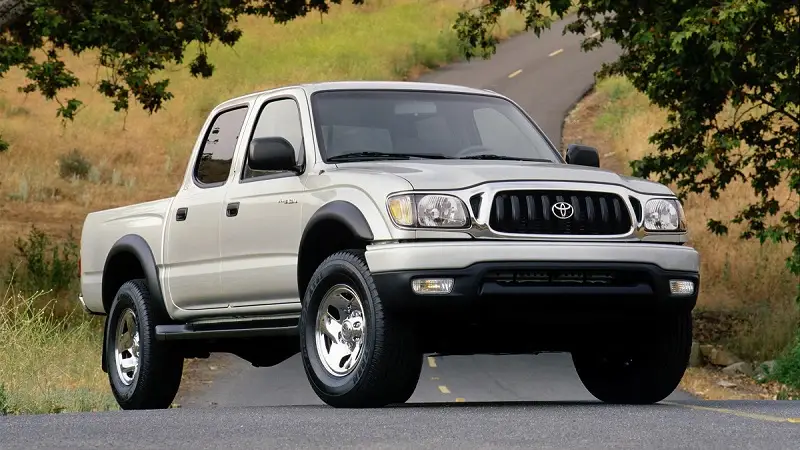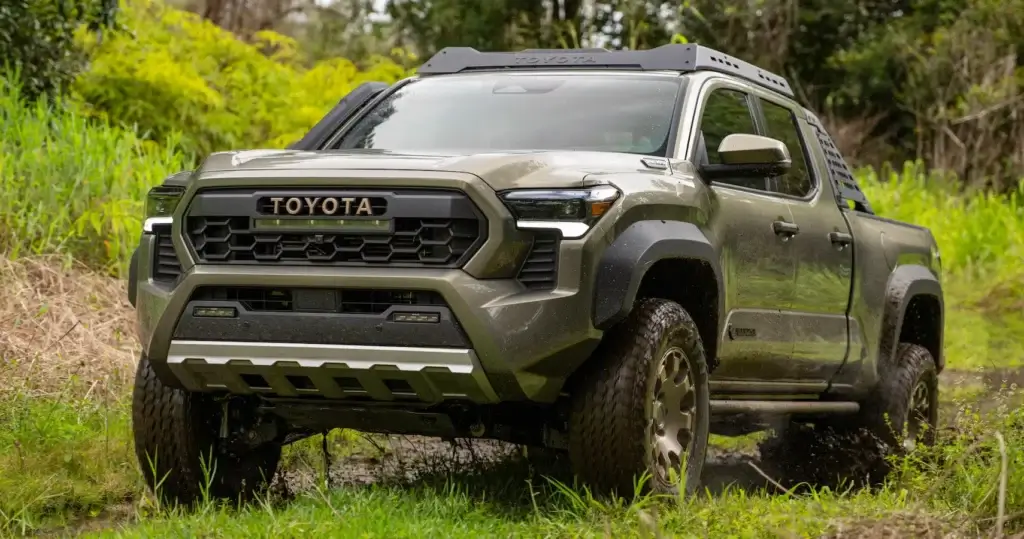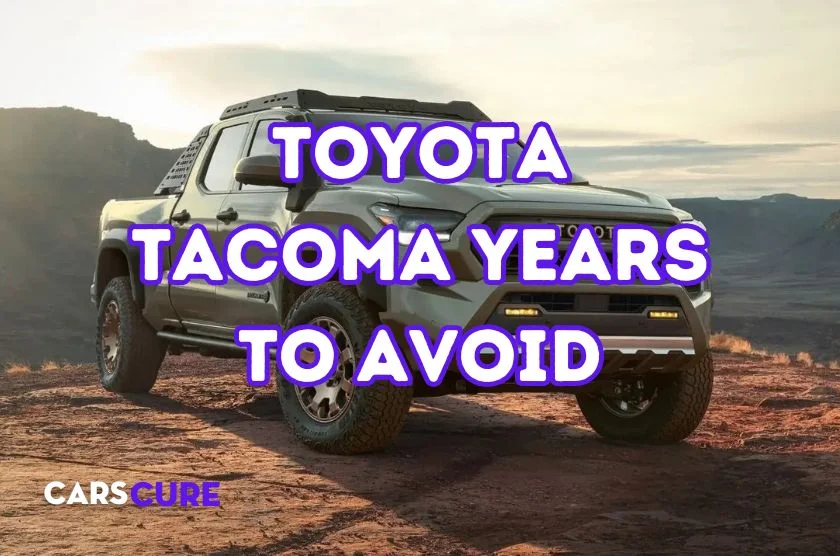Reliability is the most important factor to consider when purchasing a used Toyota Tacoma. There has been some variation in performance between model years of the Tacoma, despite its reputation for toughness and longevity. It is recommended to avoid certain Toyota Tacoma years.
It’s been associated with some expensive repairs and disappointing experiences over the years. A better purchasing decision can be made by knowing which years to avoid, avoiding unnecessary expenses, and enjoying a more reliable truck.
Avoid these Toyota Tacoma years
Some Toyota Tacoma model years have experienced recurring problems despite being known for their dependability. If you want a trouble-free ownership experience, you need to avoid these issues, which range from structural integrity concerns to mechanical failures. Here’s a breakdown of the problematic years.
| Model Year | Key Issues |
| 2005–2010 | Corrosion of frames and structures |
| 2016–2017 | Problems with transmission shifts, gear engagement delays, rough shifting |
| 2018 | Failures of safety features, electrical malfunctions, and engine stalling |
| 2019 | Recalls and airbag problems |
2005–2010
Corrosion and rust are common problems for the 2005 to 2010 Tacoma models. Toyota issued recalls to resolve this issue because it became widespread. A vehicle’s structural safety may be compromised by rust to the point that a complete replacement is needed. Especially in colder climates where road salt is prevalent, owners often report rust starting at suspension mounts and spreading quickly.
Buyers in northern or coastal regions may have greater concern during these years, since rust tends to develop more rapidly. The Toyota recall program helped some owners, but not everyone was able to have their vehicle repaired. An inspection of the frame should be performed by a professional if you are considering purchasing a Tacoma from this time period. It could be just the beginning of the rust problem as evidenced by visible rust on the outside.
2016–2017
There were widespread complaints about the transmissions of Tacomas from 2016 and 2017. Most of the complaints were associated with rough shifts, delayed gear engagements, and an overall feeling of unresponsiveness. There were plenty of reports of drivers getting uncomfortable and unpredictable driving experiences due to the transmission struggling to find the right gear.
As a result of the inconsistent shifting, there was a negative impact on towing and off-road performance. Software updates have been issued in an attempt to resolve some problems, but many owners have found that these fixes have been only partially successful. These models are less attractive to prospective buyers seeking reliability because repairing or replacing transmissions can be very expensive.
Toyota Tacoma Model Years Common Issues

There’s no denying that Toyota Tacoma is a durable vehicle, but there are always going to be flaws. Model years with issues should be considered carefully by potential buyers. Getting unchecked can result in costly and inconvenient problems, ranging from transmission hiccups to structural problems.
Transmission Problems
Some Tacoma models are prone to transmission problems, especially those produced in 2016 and 2017. It has been reported that the shifting has been rough, that the vehicle hesitates during shifts, and that the gears do not engage immediately.
As a result of these problems, the durability of the vehicle will be questioned in the long-term. The transmissions of some vehicles have even failed completely, requiring expensive repairs. You can’t expect Tacoma enthusiasts to drive smoothly and reliably with these problems.
Corrosion and rust on frames
There is a lot of rust and corrosion on the frame of the 2005 to 2010 Tacoma models. As a consequence of this issue, Toyota recalled many vehicles and replaced frames in some cases.
When the truck gets rusty, it loses structural integrity and becomes unsafe to drive. The use of heavy snow and salt on roads in some regions caused accelerated corrosion, which is why Tacomas from these years should be thoroughly inspected prior to purchase.
Concerns about engine performance
Over oil consumption, premature component wear and excessive oil consumption have all been reported in certain model years.
Especially mid-2000s models were affected, with poor performance and high maintenance costs. Depending on the severity of the issue, costly repairs may be necessary to restore the functionality of the engine over time.
Toyota Tacoma Model years recommended

As a result of its popularity and reliability, the Toyota Tacoma has earned an excellent reputation. The performance and owner satisfaction of some model years stand out.
You can make sure you have a dependable and enjoyable ownership experience if you look at these standout years.
Toyota Tacoma 2004
Tacoma’s first generation ended with the 2004 model, which was praised for its sophisticated design and durability. For those looking for a reliable midsize truck, the V6 engine is a solid choice, and it has a low number of reported issues.
Toyota Tacoma 2010
A strong build quality and reliable performance make the 2010 model a popular choice among consumers. Models from later years tend to have more expensive issues and maintain high owner satisfaction ratings. With its 4.0-liter V6 engine, the vehicle is able to provide both on-road and off-road enthusiasts with a comfortable ride.
Toyota Tacoma 2013-2015
Reliability and resale value are strong characteristics of models built between 2013 and 2015. They are popular among used truck buyers because they combine modern features with proven dependability.
2015 was the last year of the second generation, meaning many issues were resolved, and it has become one of the most reliable models.
Toyota Tacoma 2018-2020
With updated technology and safety features, the 2018 and 2020 Tacomas offer a better driving experience. It has been reported that these models perform well and provide a comfortable ride.
Featuring an updated infotainment system and improved features, the 2020 model year is a great choice.
Toyota Tacoma 2021-2023
Tacoma’s reputation for reliability continues to be upheld in recent models. As an example, Kelley Blue Book gave the 2021 model a consumer rating of 4.9 out of 5.0, indicating a high level of satisfaction with the vehicle.
For truck buyers seeking the latest features in a dependable vehicle, these newer models offer enhanced performance and advanced technology.
Nissan Murano Years to Avoid 2025 [Explained]
Hyundai Kona Years to Avoid [Complete Guide]
Mitsubishi Outlander Years to Avoid: Comprehensive Guide
Lincoln MKX Model Years to Avoid: Comprehensive Guide
Frequently Asked Questions
Which Toyota Tacoma model years should I avoid?
Potential buyers should avoid the following Toyota Tacoma model years due to various reported issues: 2005–2010, 2011–2012, 2016, and 2017. These years have been associated with significant mechanical problems and recalls that could lead to costly repairs.
What specific problems are associated with the 2005–2010 Tacoma models?
The 2005 to 2010 Tacoma models are notorious for frame rust and corrosion, which can severely compromise the vehicle’s structural integrity. This issue was serious enough to prompt recalls, including frame replacements in some cases. Additionally, these models have reported problems with suspension and steering components.
Why should I be cautious about the 2016 and 2017 Tacoma models?
The 2016 and 2017 model years have been linked to transmission problems, including rough shifting, delayed gear engagement, and complete transmission failure in some cases. Owners have also reported issues with engine stalling and other electrical malfunctions, making these models less reliable than their predecessors.
Are there any concerns with the 2018 Tacoma model?
Yes, the 2018 model year has been noted for engine stalling, electrical malfunctions, and failures of safety features. These issues have led to its inclusion on lists of model years to avoid.
How does the overall reliability of the Toyota Tacoma compare across different years?
While the Toyota Tacoma is generally known for its reliability, certain model years have exhibited significant flaws that can detract from ownership experience. After 2017, many reviews indicate a return to improved reliability, making newer models more appealing compared to those from the problematic years.
Conclusion
Off-road capability, ruggedness, and reliability continue to make the Toyota Tacoma a popular choice. There is a difference in the performance of different model years, however. It has been shown that transmission and frame rust issues have repeatedly plagued some years, such as 2005-2010 and 2016-2017. You can avoid unnecessary repairs and disappointment by being aware of these potential pitfalls.
